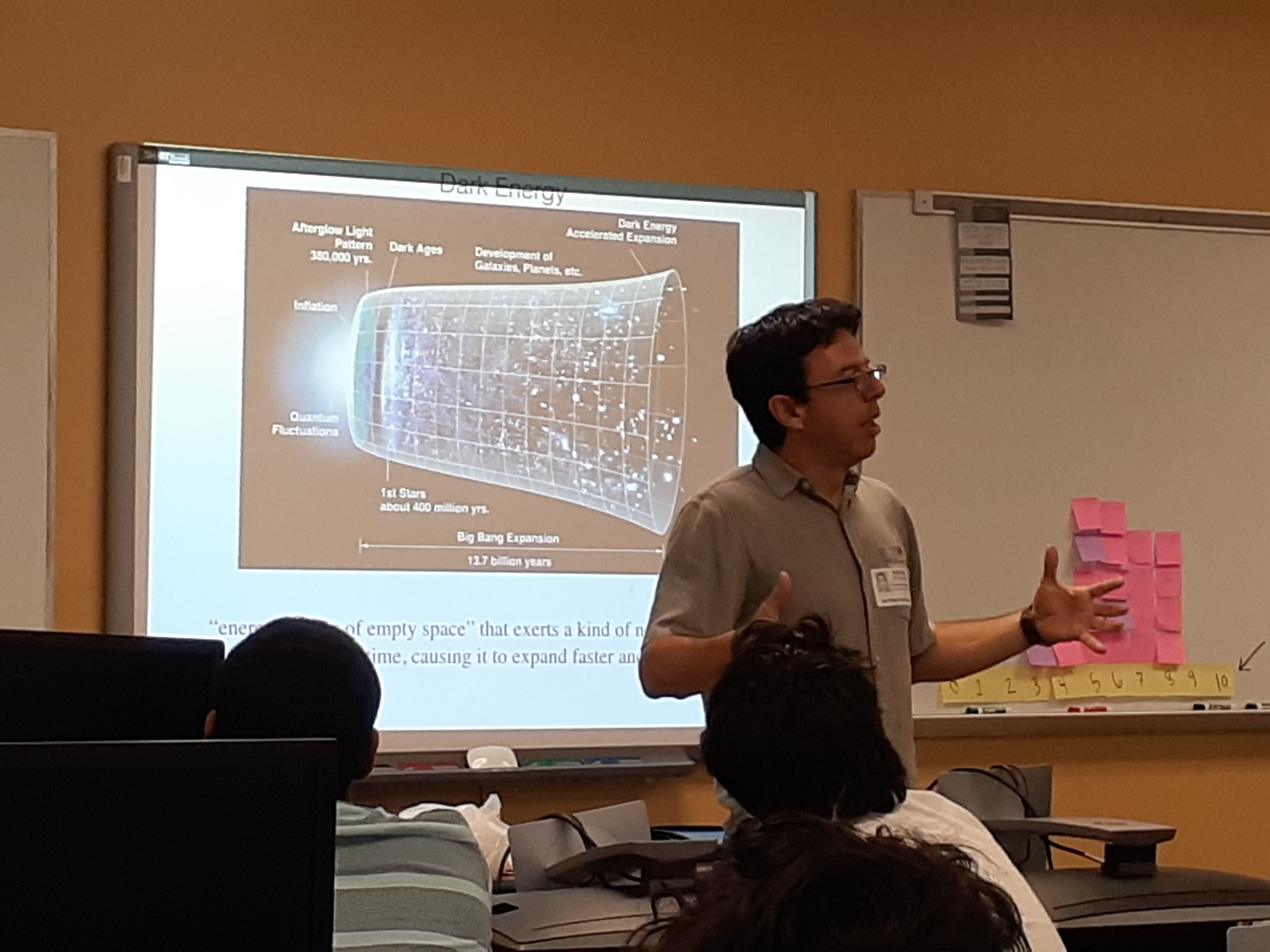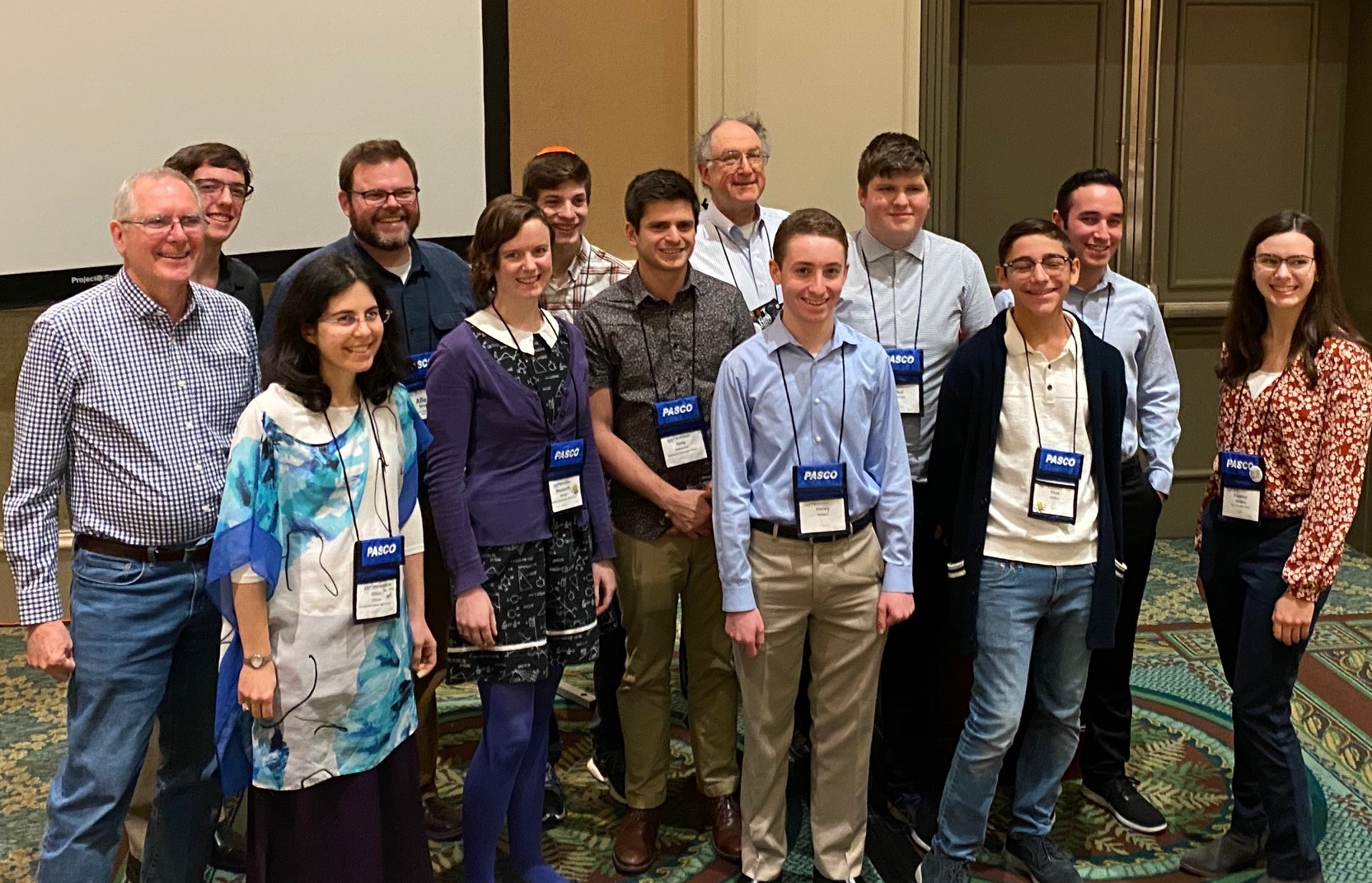Friday Flyer on Monday - January 20, 2020

Spotlight on QuarkNet at AAPT Winter Meeting 2020
As many of you know, AAPT holds two national conferences each year: one in the winter and one in the summer. At each of these meetings, there is a significant QuarkNet presence, and the current meeting in Orlando has been no exception. For the second year in a row, QuarkNet has worked with the AAPT Committee on Contemporary Physics to bring workshops to high schools near the conference. This year, Teaching and Learning fellow Adam LaMee worked with QuarkNet staff to organize these workshops for students at two Orlando schools: Oak Ridge High School and Jones High School. A special thanks goes to FIT mentor Francisco Yumicema for providing a talk and Q&A session for the Oak Ridge students.
QuarkNet staff along with LHC fellow Marla Glover led a four-hour CMS Collider Physics Workshop at the AAPT conference introducing participating teachers (and two motivated high school students from Naples, Florida!) to QuarkNet activities and masterclass data. Several QuarkNet-related talks were given during various sessions, including Modern Research Data to Enrich the K-12 Classroom (Adam LaMee), Conveying the Science of the LHC (UF mentor Darin Acosta), Infusing 21st Century Physics into the Classroom (Deborah Roudebush), Facilitating the High School Muon Underground Shielding Experiment (MUSE) (University of Illinois at Chicago QN teacher Marybeth Senser) and Developments in International Masterclasses (Ken Cecire).
Many QuarkNetters in attendance were especially proud when eight Chicago-area high school students involved in the Muon Underground Shielding Experiment (MUSE) presented four posters and four presentations describing the purpose, methodology, and results of this study of muon flux rates in the MINOS tunnel at Fermilab. Five of their supporting teachers were in attendance as well, along with Mark Adams and Cosmic fellow Nate Unterman, who all made this opportunity possible for the students.
Several QuarkNet mentors, fellows, teachers and staff serve on various committees that support the AAPT strategic plan and organize the workshops and sessions that make up conferences.
These meetings are important opportunities for teachers to network, share ideas, and build their overall professionalism. Consider attending (or even presenting at) the 2020 Summer Meeting in Grand Rapids, Michigan, or perhaps you can find a conference closer to home organized by one of the AAPT Local Sections. QuarkNet staff are here to help if you have any questions about attending or presenting at one of these professional meetings.

News from QuarkNet Central
The special QuarkNet application for CERN summer programs is still open and will be open through Monday, January 27. If you've already applied directly to CERN, great. Every QuarkNet teacher who would like to spend two weeks at CERN should go to the CERN International Teacher Programmes page and follow the links to the High School Teachers (HST) program or to International Teacher Weeks (ITW). HST and ITW are pretty much identical but take place at different times of the summer. QuarkNet teachers should also apply via QuarkNet. We have eight spaces reserved just for QuarkNet teachers this year—more than ever. This maximizes your chance to find a pathway to CERN in Summer 2020!
Registration for International Masterclasses continues! Though the Doodle polls are closed, you may find an existing videoconference to join. To register, send e-mail to Ken. The most recent IMC circular focuses on videoconferences and can be found by clicking here.

Physics Experiment Roundup
The U.S. Department of Energy recently announced that Brookhaven National Lab will be home to the future Electron-Ion Collider. Learn about upgrades to the IceCube neutrino detector. Fermilab scientists use polarization of the cosmic microwave background to estimate the mass of galaxy clusters.

Resources
The number of activities in the QuarkNet Data Activities Portfolio continues to grow and is now up to around 30 activities. You can now sort by Data Strand (Cosmic Ray, LHC, and Neutrino), Level (0-4), Curriculum Topics (both content and skills), and NGSS Practices (1-8). For more details, check out Deborah Roudebush's slides from her talk at AAPT on the Data Activities Portfolio.
Laboratory News provides this Q&A session with Dr. John Marshall about the Deep Underground Neutrino Experiment (DUNE), and symmetry features an article on Joe Farah, the undergraduate student that has been featured in more than one Friday Flyer recently. Note the mention of both QuarkNet and teacher/fellow Michael Wadness in the article!

Just for Fun
Though it's probably not very fun digging out from a recent snowstorm in Canada, it is fun—in a "wow!" sort of way—to watch the snow pile up in this sped-up video (near the top of the article). If looking at all that snow makes you feel cold, check out the long-(very-long) term forecast.
QuarkNet Staff:
Mark Adams: adams@fnal.gov
Ken Cecire: kcecire@nd.edu
Spencer Pasero: spasero@fnal.gov
Shane Wood: swood5@nd.edu





